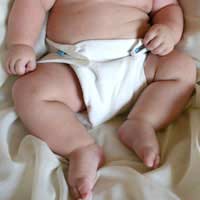Disposable vs Fabric Nappies

Expectant parents are faced with many choices. What to name the baby, breast or bottle, hospital or home birth and disposable or fabric nappies, just to name a few. Most times, the answers are more a matter of preference than a right and wrong choice. This is exactly the case when choosing what type of nappies to use, since there are advantages and disadvantages to both.
Convenience
When it comes to convenience, most parents would agree that disposable nappies win out over the fabric ones. Readily available and maintenance free, disposable nappies offer ease of use. They are especially useful when away from home since they can be thrown in the bin rather than needing to be transported home for laundering. So if convenience is the most important issue, disposable is the way to go.Cost
Cost-wise though, fabric nappies are clearly advantageous over the disposable kind. Purchased only once and reused until potty training, the cost of using fabric nappies is a fraction of that of disposables. This can be an especially important consideration for families of multiples or closely spaced siblings, since providing disposable nappies for several children at once can take a big bite out of the family budget. Parents who choose to purchase fabric nappies and launder them at home can save a considerable sum of money over the course of several years.The savings will be lessened or even nullified if parents use a nappy service, rather than washing the nappies themselves. Still, some parents prefer to use a cotton fabric nappy over disposable, even if the cost is about the same, for a number of reasons.
Environmental Considerations
Ecologically minded parents often choose fabric nappies over disposables. In the UK, it is estimated that about 9 million disposable nappies are discarded daily, ending up in landfills where they are expected to take approximately 500 years to decompose. From an environmental standpoint, disposable nappies pose a problem of epic proportions, accounting for about 4% of all household waste. Additionally, 7 million trees are felled in the UK alone in the production of disposable nappies.While many parents find the notion of self laundering fabric nappies to be distasteful, there are many nappy services that will provide a constant supply of clean nappies without contributing to the growing problem of landfill waste. Services vary in both cost and efficiency, so referrals from parents is a good way to choose a nappy service that consistently meets their customers' needs.


Re: Ultrasounds - What is EFBW and GMS?
My wife is 32.6 weeks ...and the babys weight is 1971gms...is that normal or not...please reply me.....
Re: Ultrasounds - What is EFBW and GMS?
my 18th week and baby weight 252 it is gud or bad...please tell me....
Re: Ultrasounds - What is EFBW and GMS?
Hello!i have 21 weeks and 4 days pregnancy.. and my EFBW is 430gms.. is that normal?? Will my baby healthy or not??
Re: Abdominal and Pelvic Pain During Pregnancy
Left pelvic pain, backpain pregnency positive' is any problem, already ectopic happen
Re: Ultrasounds - What is EFBW and GMS?
My wife is 21 week 2 day . In scan report EFRW 415 GM is normal or not . Can you please help me to know current status of…
Re: Ultrasounds - What is EFBW and GMS?
I am 34.1wks pregnant my baby weight is 2215gm is my baby healthy
Re: Ultrasounds - What is EFBW and GMS?
My wife is 37weeks 5days pregnant E.F.B.W - 3010 grams how is she
Re: Ultrasounds - What is EFBW and GMS?
I am pregnant of 36 week 2 days and my EFBW is 1949 is it normal..?
Re: Ultrasounds - What is EFBW and GMS?
i had my ultrasound rhis sept 19 i wonder what is rhis number for efbw 2336 stands fir can you please give me an idea…
Re: Ultrasounds - What is EFBW and GMS?
my wife is 16.2 weeks and done early tiffa scan. E/O an elongated anechoic lesion with minimal internal echogencity…